BEINFORMED
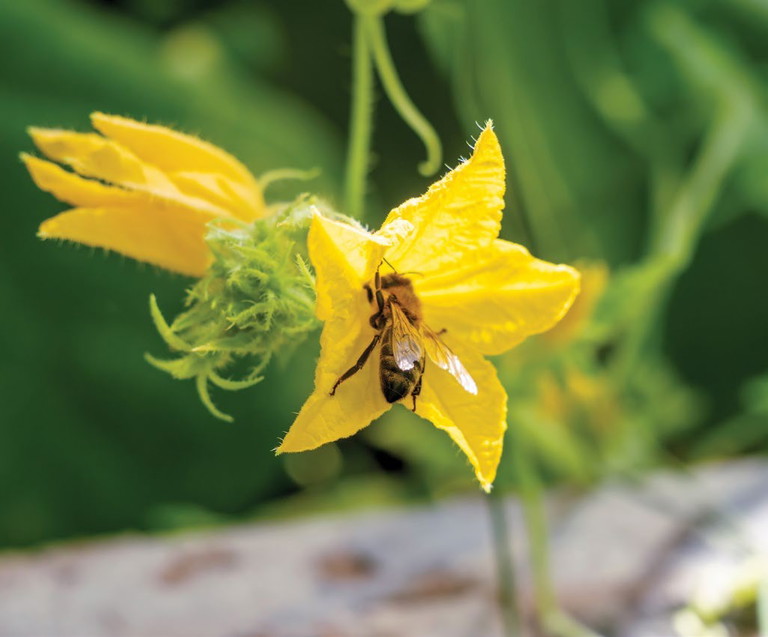
So far, over 1,000 Western Australian beekeepers have taken advantage of the program.
MEET YOUR VARROA OFFICERS
Here to help until January!
When eradication of the varroa mite in NSW failed, the national focus shifted to preparing all states and territories for its eventual arrival. That’s where WA’s Varroa Officers come in.
Words Shannon Holt, Project Officer (Bees)/Varroa Development Officer, DPIRD and Officers
WE’RE here to support beekeepers with:
• Demonstrating how to check hives for mites
• Finding and marking queens (to assist future surveillance) and discussing queen management
• Sharing current recommended varroa management practices
• Helping you build a mite management plan tailored to your apiary
What a visit from a Varroa Officer looks like depends on you. Sometimes it’s hands-on in the apiary: assisting with hive clean-up, frame rotation, queen marking, and trialling different mite check methods. Other times, it’s a chat over a cup of tea, planning your varroa management strategy and discussing chemical treatment options.
Although we all hope WA remains varroa-free for as long as possible, the Varroa Officer program is funded as part of the emergency response to the initial incursion in NSW, which means it ends in January 2026, regardless of when the mite might reach WA. That leaves just five months to make use of this valuable resource.
Meet your Varroa Officers and get in touch to arrange a visit this spring
So far, over 1,000 Western Australian beekeepers have taken advantage of the program.
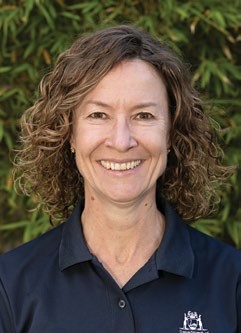
Kate Powell
From Accidental Bee-wrangler to Hive Whisperer
It all started with a sting and a whole lot of curiosity. I didn’t set out to become a beekeeper, but somewhere between childhood fascination and adult ambition, bees found their way into my life and never left.
“ Turns out, once you get stung (literally and figuratively), the buzz is hard to ignore. ”
Fast forward to 2022, and I dove headfirst into the world of beekeeping with DPIRD’s Apiary team. No training wheels, just straight into the hive. Working alongside seasoned beekeepers, I quickly learned that bees don’t follow the rules. Each hive is its own quirky little kingdom, full of surprises, challenges, and sweet rewards.
Helping manage the DPIRD apiary has been an unforgettable experience. Keeping those buzzing beauties alive and thriving year-round is no small feat, but being part of that journey has been incredibly satisfying. I’ve also been grafting queens for DPIRD’s surveillance hives for several years now, an intricate and rewarding task that plays a vital role in maintaining healthy colonies.
Now, as part of the National Transition to Management program, I’m excited to help prepare beekeepers to manage and live with varroa. We’re yet to see varroa in WA, but it’s essential that we all know how to respond, so when it does arrive, we’re ready.
If you’re keen to keep your bees alive and healthy after varroa arrives, give a VDO a call and let us show you what to do.
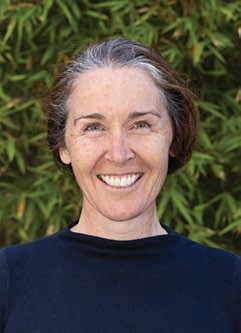
Tiff Bates
Self Confessed Bee Nerd
So you get the BeeInformed, AND you read the BeeInformed... Interested in bees, huh?
Want to wander through your own beehive with a serious bee nerd?
I’ve been the UWA apiary manager for the past 20 years, investigating bee topics such as immunity, nutrition, magnetoreception, gut bacteria, drone selection, the list is fascinating. I love breeding queens, and I’m part of the Better Bees Rottnest Program, national bee breeding networks, and have visited breeders in many countries who are selecting for varroa-tolerant traits.
I also spent years as a commercial beekeeper in WA, caring for my bees, raising queens, and learning the floral cues and seasonal indicators that help optimise harvest and hive health.
There’s always more to learn, more tools to add to the beekeeping toolbox. Whether it’s preparing for each season, managing swarming, harvesting, or maintaining hive balance, every time we open a hive or observe the bees, we discover something new.
I’ve been a Varroa Development Officer since September last year and am looking forward to these final months of sharing knowledge with WA beekeepers. It’s been a unique experience working with so many different ‘keepers’.
“Even if you don’t have specific questions, it’s a lovely excuse to open your hive with a fellow enthusiast.”
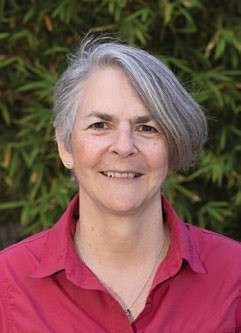
Wendy McIntyre
Community Apiarist and Bee Buddy Coordinator
Wendy McIntyre is a dedicated and experienced beekeeper with over a decade of hands-on experience in hive management, training, mentoring, and swarm collection. Her journey began with the guidance of a mentor, sparking a deep passion that has grown into a lasting commitment to the beekeeping community in Western Australia.
Wendy serves as a committee member of the WA Apiarists’ Society (WAAS), where she coordinates the Bee Buddy programme and is an active member of the training team. She founded and led the Avon Valley Bee Buddy Group, fostering local connections and knowledge-sharing among beekeepers. Wendy has managed the Perth training apiary and coordinates the popular Winter Series workshops, covering practical skills from frame building to creating wax and body products.
Holding a Certificate III in Beekeeping, Wendy combines formal training with extensive field experience. She has volunteered at numerous events, including local conferences, Honey Month, and educational programmes at UWA.
Her calm, approachable mentoring style has supported countless recreational beekeepers through in-person apiary guidance, emergency assistance, and remote consultations.
Wendy is deeply committed to promoting hive health, supporting beekeepers of all levels, and upholding WA’s reputation for clean, high-quality honey. As a Varroa Development Officer, she looks forward to continuing her work by delivering varroa education, practical training, and hive management support across the state.

Wayne Passmore
Beekeeper, Educator, and Varroa Development Officer
Bees are incredible creatures, amazing little beings that have captivated Wayne’s attention for over thirteen years. As a dedicated hobbyist beekeeper and passionate advocate for apiculture, Wayne has combined hands-on experience with formal training to support and educate others in the field.
Wayne has served as the Training Coordinator for the Western Australian Apiarists’ Society (WAAS) for over six years, helping guide new and experienced beekeepers through the complexities and joys of hive management. His qualifications include the National Varroa Mite Training Programme, the Department of Primary Industries and Regional Development (DPIRD) WA Hive Heroes programme, and a Certificate III in Beekeeping, equipping him with the knowledge and practical skills to mentor others.
Wayne continues to contribute to the industry through his role as a DPIRD Varroa Development Officer (VDO). In this capacity, he plays a vital role in the National Varroa Mite Management Programme, working directly with recreational and commercial beekeepers to improve hive health, implement sustainable practices, and manage the threat of varroa mite.
Wayne, along with other team members, invites all commercial and recreational beekeepers to join us in the fight to prevent the spread of varroa. Please get on board.
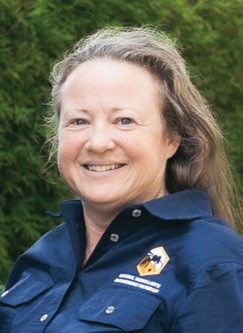
Helen Humphreys
Championing WA’s Beekeeping Community
I’ve been shoulder-deep in bees (figuratively... mostly) for over a decade now, and the obsession only seems to be growing. What started as a fascination has become a full-time passion, from running a small commercial operation to contributing to the beekeeping community through roles like committee member, trainer, and newsletter editor for the WA Apiarists’ Society.
Most of my work takes place in WA’s South West, where I connect with everyone from backyard beekeepers to commercial operators. The goal is to build confident beekeepers by sharing practical knowledge and strong decision-making skills, all tailored to local conditions.
Education is a key focus, not just for beekeepers, but for schools and the broader community. Whether it’s on-farm or classroom visits, community talks, or hands-on demonstrations, it’s all about sparking curiosity, appreciation, and awareness for honey bees and our native pollinators.
Alongside education and mentoring, I’ve been directly involved in national biosecurity initiatives, including the 2022 varroa eradication effort, and have served as a Varroa Development Officer since 2024. These experiences have reinforced the critical importance of knowledge-sharing and collaboration across all levels of beekeeping.
“Beekeeping is a constant journey of learning, each hive, each season, and every conversation brings a fresh perspective.”
Whether it’s troubleshooting a challenging hive, improving seasonal preparation, or simply swapping stories with fellow beekeepers, it’s all about supporting one another and ensuring our bees (and beekeepers) stay healthy and thriving.

Shannon Holt
Drone Wrangler and Varroa Educator
Honey bees first caught my attention at uni, and I spent nearly eight years researching everything from bee immunity and the fungal disease Nosema to breeding for disease resistance.
“ Studying bees takes you down some weird and wonderful paths… like the time I fed drone bees Nosema spores mixed with seminal fluid collected from drone ejaculates! ”
I did feel bad feeding them their own seminal fluid, but it turns out it has incredible antimicrobial properties that can kill Nosema and teach us a lot about bee immunity.
I’ve also had the chance to be involved in hygienic behaviour trials through the Rottnest breeding program, Better Bees WA.
As for keeping my own bees, I’m still early in the journey — just 3.5 years in, and learning every day. I truly believe no question is too small, and that everyone has something to teach and something to learn.
In my role at DPIRD, I’ve loved visiting beekeepers and seeing the incredible variety in setups, styles, and problem-solving approaches. It’s inspiring to see how one challenge can be tackled in so many creative ways.
Honey bees first caught my attention at uni, and I spent nearly eight years researching everything from bee immunity and the fungal disease Nosema to breeding for disease resistance.
MORE INFORMATION
Varroa may be on its way, but WA beekeepers can prepare. With help from Varroa Development Officers, now’s the time to build confidence, protect hives, and stay ready.